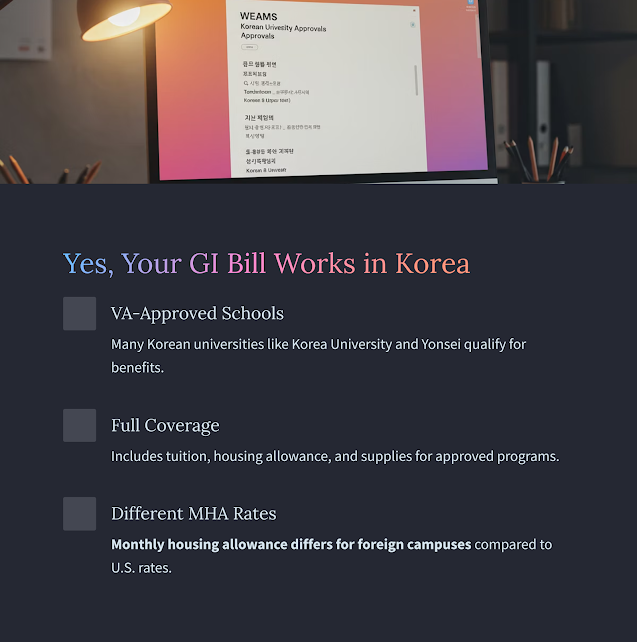How American veterans can use VA education benefits to build a new life in Korea
Can You Use the GI Bill While Living in Korea? Yes—Here's How to Do It Right
As a Korean-American U.S. Army veteran living in Korea, I discovered that the GI Bill is more than just tuition assistance—it's a tool for rebuilding your identity and career overseas. This guide will help fellow veterans understand how to use their VA education benefits while living in Korea, navigate local systems, and align their goals with meaningful, long-term outcomes.
Yes, You Can Use the GI Bill in Korea
But only at approved schools and under specific conditions
Many veterans don’t realize the GI Bill is usable at VA-approved foreign institutions, including universities and language programs in Korea.
To check if your target school qualifies, visit the VA’s WEAMS Institution Search and filter by “Foreign Schools.” Schools like Korea University and Yonsei often appear on the list.
Important: The Post-9/11 GI Bill covers tuition, housing, and supplies—but the monthly housing allowance (MHA) differs for foreign campuses and may be lower than U.S. rates.
Best Programs for GI Bill Use in Korea
Not all degrees are created equal when it comes to post-military careers
Look for programs that lead to portable careers like tech, international business, education, or language instruction. Here are some popular veteran-friendly fields:
| Program Type | Why It's a Good Fit |
|---|---|
| Korean Language Programs | Helps with integration and local jobs |
| International MBA | Great for global business or trade roles |
| TESOL Certification | Opens doors to English teaching jobs |
| Cybersecurity/IT | Remote work opportunities from Korea |
Veterans fluent in Korean can also explore government jobs or contracting roles linked to U.S. bases.
Translating Military Experience Into a Civilian Path
The GI Bill gives you time to redefine your professional identity
Military service builds leadership, logistics, and operational skills—but you'll need to reframe that experience for civilian sectors. Take classes in resume writing, public speaking, or project management to improve job market readiness.
Also, use VA-sponsored career coaching programs like:
-
VetSuccess on Campus (VSOC)
-
VA CareerScope
-
LinkedIn Premium (free with GI Bill)
These help bridge the gap between military experience and your future career goals.
Housing Allowance: Understand the Difference Abroad
Know what to expect when budgeting for your life in Korea
Unlike U.S.-based MHA rates tied to zip codes, the overseas MHA is a fixed rate based on the average cost of living outside the U.S.
As of recent updates, this amount hovers around $1,600 USD per month—but it can change yearly. In Korea, that amount can cover housing fully outside Seoul, but might fall short in major districts.
Always budget with extra room for utilities, transport, and visa costs.
Visa and Legal Status Tips
Education alone doesn't grant long-term residency—know your options
To attend school in Korea using the GI Bill, you’ll need a D-2 student visa. This visa allows legal residence during your education but may not lead to permanent stay unless you later qualify for another visa (like F-2 or F-5).
Pro tip: Marrying a Korean national or transitioning to an E-series work visa are common paths among veterans seeking to stay long-term.
Maximize Your Time: Build a Network While You Study
Korea is competitive—relationships matter as much as credentials
Use your time as a student to build a professional and social network. Join expat business forums, LinkedIn Korea groups, and alumni associations.
Look for veteran communities like VFW Korea, AMCHAM, or Facebook groups such as “Veterans Living in Korea” for support, job leads, and mentorship.
Final Take: GI Bill + Korea = A Powerful Opportunity
Moving to Korea post-service may feel like starting over—but with the GI Bill in hand, you have a unique advantage most foreigners don’t. You’re educated, experienced, and funded.
Key insight: Use your benefits wisely, combine them with a local strategy, and you’ll be able to create a fulfilling, sustainable life in Korea as a U.S. veteran.









